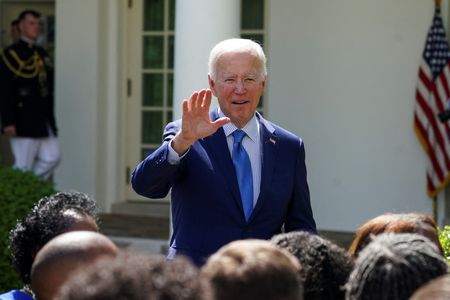 1
1 1
1
By Steve Holland and David Brunnstrom
WASHINGTON (Reuters) – At a summit next week with South Korean leader Yoon Suk Yeol U.S. President Joe Biden will pledge “substantial” steps to underscore the U.S. commitment to deter a North Korean nuclear attack on South Korea, a senior U.S. official said on Friday.
“We are working extraordinarily and intensively with the South Koreans to take the necessary steps to buttress both public perception and the reality of our commitments,” the official told Reuters ahead of Yoon’s summit with Biden next Wednesday.
The official said it ranked as one of the greatest U.S. achievements that a number of Indo-Pacific countries that could have built nuclear weapons had chosen not to because of the protection of the so-called U.S. nuclear umbrella.
“We have been very clear that our commitment to that nuclear deterrent stands, is ironclad for South Korea,” said the official, who did not want to be identified by name.
“President Biden will … be talking substantial steps to underscore that, to update it, to make clear that everyone has little doubt of our commitment to standing with South Korea, even in the face of provocation from North Korea, saber rattling from Russia, and frankly ambitions for a nuclear buildup on the part of China,” he said.
Yoon’s week-long state visit from Monday comes at a time when more South Koreans say their country should develop its nuclear arsenal to guard against attack by nuclear-armed North Korea and its expanding arsenal of missiles and bombs.
The official did not elaborate except to say the moves would involve “a variety of things from certain kinds of computations, more with respect to our actual activities, and some high-level engagements between the United States and South Korea.”
In a poll released on April 6 by the Asan Institute for Policy Studies in Seoul, 64.3% of South Koreans supported developing nuclear weapons with 33.3% opposed.
The survey showed 52.9% of South Koreans were confident the United States would use nuclear weapons to defend South Korea in the event of a nuclear attack by North Korea. But the number dropped to 43.1% when respondents were asked if they thought the U.S. would risk its safety to defend South Korea, with 54.2% saying the U.S. would not take such risks.
A second official said the United States welcomed the role South Korea had played in supporting Ukraine and would “welcome additional steps (It) might be willing to take.”
“But we also recognize like every country they have to make those decisions based on their own calculations,” he said.
The official said North Korea’s human rights situation, which Yoon has made a focus would likely be a subject of discussion at the summit.
Yoon, in an interview with Reuters on Tuesday, signaled for the first time a softening in his position on providing weapons to Ukraine, saying his government might not “insist only on humanitarian or financial support” in the event of a large-scale attack on civilians or a “situation the international community cannot condone”.
The first official said the summit, only the second state visit under the Biden administration, reflected Biden’s appreciation of Yoon’s strong leadership and his rapprochement with Japan, the other key U.S. ally in northeast Asia.
Biden will also commend huge South Korean tech investment in the United States since he took office, which was now approaching $100 million, the official said.
(This story has been refiled to correct the spelling of Asan Institute for Policy Studies in paragraph 8)
(Reporting by David Brunnstrom, Steve Holland and Costas Pitas; Additional reporting by Choi Soo-hyang in Seoul; Editing by David Gregorio)